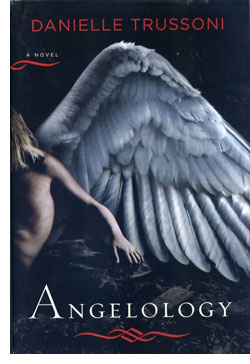 |
 |
 Danielle Trussoni
Danielle Trussoni
Angelology
Viking / Penguin
US Hardcover First Edition
ISBN 978-0-670-02147-5
Publication Date: 03-09-2010
452 Pages; $27.95
Date Reviewed: 04-04-2013
Reviewed by: Rick Kleffel © 2013
Index:
Fantasy
General Fiction
Horror
Science Fiction
Editor's Note: Now available as a trade paperback, the sequel, 'Angelopolis' has just been released in hardcover.
Knowing who you are is not so straightforward as you might hope. The degree to which we are shaped by the lives we have lived is an invisible cage. The stories those whom we are fated to love and trust have told us are the baseline from which we build our identity. It's easy to be hopelessly, helplessly trapped and have no concept of your confinement.
Sister Evangeline looks forward to a life of quiet servitude as a nun in the Franciscan Sisters of Perpetual Adoration in the wilds of upstate New York. She's in charge of rejecting those who would seek access to the convent's papers, but the letter from Verlaine requesting access to correspondence between the late Mother Innocenta and Abigail Rockefeller touches a nerve, as does the man himself. That letter is the first page to be turned in a very complicated and ultimately compelling story.
'Angelology' by Danielle Trussoni establishes itself early on as something much more than a religious thriller. A prologue gives us a glimpse of the monsters, and the prose and pacing are those of a novel of gothic horror. There's a brooding, detailed feel to the story that unfolds here, rather slowly. 'Angelology' builds its case carefully and lures the reader into a pleasingly complicated secret history. Trussoni focuses on character, place and atmosphere and delivers a novel where what we know — about ourselves, our worlds and the characters in the novel — are the through-lines for an engrossing story.
The reason to file this one with Gothic Horror as opposed to vapid thriller is Trussoni's prose, which feels carefully (but never overly) crafted. She matches her words to her environments, which trend towards old, decaying, decadent and scholarly. The convent of Sister Evangeline's confinement is deeply described. Trussoni has a great facility for crafting the geography of her settings, giving us a firm feel for the places where conversations about obscure letters and musty history turn out to have a sort of cultural resonance.
Driving the story are characters who step forth from the shadows but never leave them behind. Evangeline embarks on a classic gothic heroine's journey of self-discovery, while Verlaine finds himself employed by the Grigoris, who prove to be more powerful than he might have been disposed to believe. The Grigoris are in fact one of a number of fallen angels, part of a complicated cosmology that Trussoni reveals over the arc of the novel. These angels are rich beyond compare and not on the side of the angels as we might have guessed. But the spoiled, soiled rich — with wings — make for enjoyable antagonists who are just as interested in Evangeline's identity as she is.
'Angelology' follows the gothic plot template, offering readers a novel where the plot unfolds in a series of revelations about the true nature of the world. Trussoni makes entertaining and extremely gripping explorations into history, with a World War II archaeological dig that's quite thrilling and not a little bit surreal. Some scenes unlocked from Evangeline's memories hang like nightmares, even as they slot nicely into her world-within-a-world-building plot.
Ultimately, 'Angelology' takes flight towards a sequel, but Trussoni's first novel in the series is a satisfying story unto itself. Our spiritual journeys of self-discovery are ultimately exercises in escape from the confines in which we have kept ourselves. Only when we understand our own identity is escape even conceivable. Actually doing so is another matter entirely, but in reading 'Angelology' it's possible to rediscover this world, to look at the shadows and see more than an absence of light.
|
 |
|
|
 |
| |
Review Archive
All Reviews alphabetized by author.
General Fiction
Non-Genre, general fiction and literature.
Horror
Supernatural fiction, supernatural horror and non-supernatural horror.
Science Fiction
Science fiction, science fantasy, speculative fiction, alternate history.
Fantasy
Fantasy, surrealism and magic realism.
Mystery
Crime, thrillers, mystery, suspense.
Non-Fiction
Non-Fiction, True Crime, Forteana, Reference.
Poetry
|
|
 |
|




